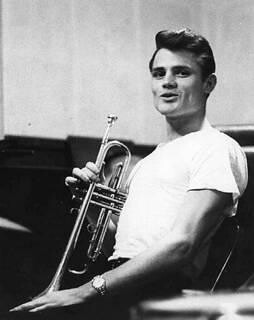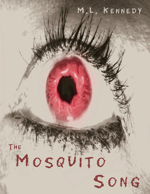There is one reason why I will never, ever try heroin: I know Chet Baker’s life story. Okay, there are other reasons, but his story ranks near the top. Of course there is no shortage of musicians who have suffered serious decline or death due to drugs. But Baker’s story resonates with me more than any other because of the squandering of natural gifts and the stark contrast between his image and the truth.
Chet Baker was a largely self-taught musician. His enlistment in the army in the 1940s and 50s brought him to the west coast, where he was exposed to the cool jazz sound that was emerging. His style seemed particularly shaped by fellow trumpeter Miles Davis, eschewing flashiness in favor of melody and subtlety. Baker was not a highly regarded songwriter (in fact he never learned to read or write music), but he did have a couple of advantages over counterparts such as Davis, namely his voice and his look. This is how Chet Baker looked in the 1950s:

And this is how he sounded:
Audio clip: Adobe Flash Player (version 9 or above) is required to play this audio clip. Download the latest version here. You also need to have JavaScript enabled in your browser.
James Dean looks, a golden voice, and a broadly accessible cool jazz sound: I believe that’s what music executives would consider crossover appeal. And Baker achieved a great amount of success being marketed as the cool, sexy singer who also happened to be a great trumpeter.
But that success would be short-lived. Like many jazz musicians (and soldiers, for that matter) in the 1950s he had taken to using heroin. His addiction came to the fore in the 60s, with mounting legal, financial, and health troubles. He served jail time in the U.S. and Europe, including a year in an Italian prison. He pawned his instruments to raise drug money. And he somehow ended up breaking his front teeth; he made a dubious claim about being mugged but the suspicion was that it was simply decay from heroin abuse. As you might imagine, front teeth are important for playing the trumpet. As such, he was forced to switch to the flugelhorn, a larger instrument that is typically played in a lower register and requires less impact on the teeth. Here’s a 1964 performance from Baker clearly showing his missing teeth:
I suspect whoever decided to shoot that video with Baker missing his front teeth may have also dabbled with hard drugs.
Time passed and Chet Baker essentially vanished from the American scene although he did continue to tour in Europe and Asia where he had a large following. In the 1980s, he would have something of a revival in the U.S. thanks in part to Elvis Costello’s patronage. But by this point, Baker had lost much of his vocal luster and the adjustment to playing with dentures had also negatively impacted his trumpet sound. He recorded prolifically in this period, but the quality was extremely variable. For me there is one highlight, and it is his mid-80s recordng of Elvis Costello’s “Almost Blue”:
Audio clip: Adobe Flash Player (version 9 or above) is required to play this audio clip. Download the latest version here. You also need to have JavaScript enabled in your browser.
Although that is one of his higher quality performances from that period, you can hear how the precision and range of his voice have suffered. Decades of heroin use did not spare his looks either:
In 1988, Chet Baker died by falling out of a second-story hotel window in Amsterdam. It’s unclear how the fall happened, but his body was found to contain heroin and cocaine.









